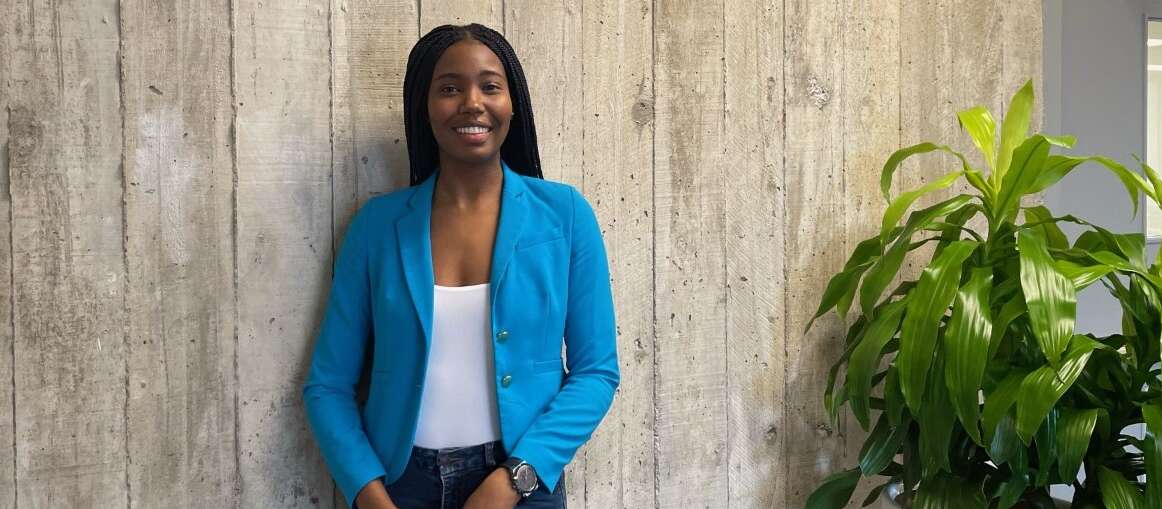Angel Culmer is committed to creating space for herself and her fellow Black University of Guelph students, and space for learning the history of Black Canadians and celebrating their contributions.
Culmer is the new president of the Guelph Black Students Association (GBSA), a volunteer-driven U of G organization that provides a welcoming space for Black students.
When the biomedical sciences major arrived in Canada four years ago as an international student from the Bahamas, she looked for a place to meet and socialize with other Black students.
What she found with the GBSA was a welcoming community of people who came from myriad backgrounds and cultures and who shared the experience of being Black in a community where they were often underrepresented.
Now as president, Culmer works hard to meet new Black students and encourage them to join. The GBSA has provided her a safe space to discuss issues facing Black students and to debate larger issues in the Black community.
But mostly what it’s been for Culmer is a space where she can simply relax.
A place of welcome, and refuge

“As a person of colour, we face a lot of what I’d call microaggressions – both intentional and non-intentional — and that can get tiring,” she said.
For example, some GBSA members eat foods that others aren’t used to seeing or smelling and are often asked to explain their culture or even mocked for their “weird” culinary choices.
“Sometimes people just want a place where they can eat their food in peace, so the GBSA space provides that. You can be around people who recognize how tiring it can be to field these microaggressions and won’t diminish it,” she said.
Two summers ago, the GBSA became more than just a gathering place: it became a refuge.
The killing of George Floyd and the spread of the Black Lives Matter marches were both trying and tiring for many Black students. Many sought a gathering place where they could grieve what was happening and find others who understood the spectrum of feelings they were experiencing.
“It can be traumatic watching these incidents over and over. It causes emotional harm that builds up,” said Culmer. “When you’re in a space where Black people are underrepresented, we get tired of being asked to educate non-Black peers about why it’s traumatic, or advocate for or represent an entire community.”
She welcomed a space where she and others could choose whether to talk about these issues, or deliberately avoid such a discussion.
Raising awareness of Black Canadian history
Culmer and fellow GBSA members have also been involved in development of U of G’s new Black Canadian studies minor program.
They are continuing the program development work of 2020-21 GBSA executive members Chioma Nwebube, Mechaela Alfonso and Briana Green-Ince.
The minor is an important addition to U of G’s academic offerings, said Culmer, because it will shed light on the largely unheard history of the Black community in Canada.
“When I arrived in Canada, I thought I would learn a lot about the history of my ancestors here, but I was surprised to find I didn’t,” she said. “There was the occasional mention here and there of Black people in Canada, but most of it related to Canada’s connection to Africa.”
Allowing all students to learn about the many contributions of Black Canadians is “an important step in the right direction,” said Culmer.
“It’s a history that’s not always pretty but I believe to bring justice to this community, it’s a truth that should be shared,” she said.
At the same time, understanding the achievements of Black Canadians is important, she said.
“People can be limited because they fail to see how great their ancestors have been. Remembering those great leaders is important; but equally important is celebrating the present,” she said, adding it’s why she relates to this year’s Black History Month theme of “Cultivating Joy.”
“We’re always fighting for more space, and we need to continue that fight, but I think we should take time to celebrate the space we are in, too. That’s worthy of celebrating.”
Contact:
GBSA (formerly the C.J. Munford Centre)
munford@uoguelph.ca
